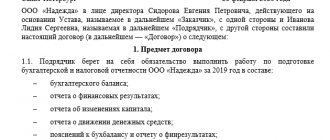An organization’s collective labor agreement is a legal act on the basis of which the relations of an LLC or individual entrepreneur with employees represented by their legal representatives in the field of labor are regulated. Business owners enter into contractual agreements with trade unions and other official representatives of employees on the basis of Art. 40 Labor Code of the Russian Federation. Let's talk about the features of its regulation.
Why enter into a contract agreement?
The adoption of a collective labor agreement is carried out on a voluntary basis: no one can force anyone to enter into the type of agreement in question. Then why is it needed?
The CTD is used to consolidate the rights and obligations of the entrepreneur and employees, as well as to take into account the mutual interests of the parties in the sphere of regulating the labor relations of the employer or employees, based on the criteria of social partnership. The quintessence of such a partnership is the equality of the parties, logically connected with all other principles from Art. 24 Labor Code of the Russian Federation.
The document applies to all personnel, including part-time workers, homeworkers and employees working under fixed-term contracts. You can conclude a contractual contract in a company or a separate branch/division.
An employee’s collective labor agreement allows:
- stabilize legal relations and personnel policies;
- increase employee motivation;
- simplify the procedure for holding personnel accountable under the Labor Code of the Russian Federation;
- optimize the management of the wage fund by establishing specific conditions for the provision of payments;
- reduce overall salary costs - the manager has the right not to pay taxes on bonuses and social benefits. payments specified in the collective labor agreement. Costs under the CTD are included in the cost price as necessary payments (see Article 255 of the Tax Code of the Russian Federation);
- increase loyalty to the employer through support and provision of social services. employee protection;
- simplify and unify internal document flow on personnel issues;
- reduce costs associated with disputes with staff: during the period of validity of the agreement under consideration, employees do not have the right to unilaterally demand changes to previously agreed conditions. The use of KTD allows you to obtain additional protection of the rights of an entrepreneur in court.
By virtue of Part 3 of Art. 41 of the Labor Code of the Russian Federation, the employment contract also reflects the interests of the business owner, since this agreement establishes the guarantees necessary for the performance of labor duties by personnel. Thus, its implementation in practice is beneficial for all parties to labor relations.
The only reason why employers hesitate to implement CTD at the enterprise is the additional financial burden of providing guarantees and benefits to employees.
Why does a company need a collective agreement?
In accordance with Art. 27 of the Labor Code of the Russian Federation, the conclusion of a collective agreement is one of the forms of social partnership. This means that no one can oblige the company and employee to create and sign this document, and its absence does not imply liability.
A collective agreement can be concluded in the company as a whole - and then its effect will apply to all employees. But the agreement can also be concluded separately in the company’s branches, representative offices and other separate structural divisions - in this case, the document applies to all employees of the corresponding department.
Why do we need a collective agreement?
In labor relations, many issues arise that require separate consideration. These issues may concern motivation, material support for employees, the remuneration system, etc. A collective agreement helps clarify all the details of the relationship between employer and employee, allows the company and individual entrepreneur to comply with the requirements of labor legislation and protect the interests of the parties.
For example, a collective agreement may stipulate the procedure for indexing wages established by a specific company. Namely, questions about frequency, the amount of indexation and the part of the salary that will be indexed.
It is convenient to refer to the collective agreement when drawing up an employment contract, when you need to clarify issues of bonuses in the company. That is, you can write in the employment contract that bonuses are paid in accordance with the collective agreement, and in the collective agreement make a reference to the Regulations on bonuses.
The collective agreement is concluded between:
- employees represented by their representatives (trade union or other representatives elected in accordance with the Labor Code);
- employers represented by his representative (individual entrepreneur, head of the company, head of the representative office, branch and other separate structural unit).
Any collective agreement is based on the following basic principles:
- equality of rights of the parties and consideration of their interests;
- compliance with labor laws;
- freedom of choice when discussing the points contained in the contract;
- the possibility of ensuring accepted obligations (since there is liability for violating the terms of the collective agreement).
Contents of the collective agreement
Art. 41 of the Labor Code of the Russian Federation establishes that the content and structure of the collective agreement are determined by the parties, while it provides an approximate list of issues on which mutual obligations of employees and the company or individual entrepreneur may be included in the collective agreement. In this case, the parties have the right to expand or, conversely, narrow the scope of the clauses.
So, in particular, you can include obligations on the following issues:
- forms, systems and amounts of remuneration;
- payment of benefits, compensation;
- system for regulating wages taking into account rising prices, inflation levels (indexation), and fulfillment of indicators determined by the collective agreement;
- employment, retraining, conditions for releasing workers;
- working time and rest time;
- improving working conditions and labor protection for workers, including women and youth;
- respecting the interests of workers during the privatization of state and municipal property;
- environmental safety and health protection;
- guarantees and benefits for employees who combine work with training;
- health improvement and recreation for employees and members of their families;
- partial or full payment for food for employees;
- control over the implementation of the collective agreement, etc.;
- refusal to strike if the relevant conditions of the collective agreement are met;
- other issues determined by the parties.
A collective agreement, taking into account the financial and economic situation of the employer, may establish benefits and advantages for employees, working conditions that are more favorable in comparison with those established by laws, other regulatory legal acts, and agreements.
The Ministry of Labor approved the model of the collective agreement, but it is advisory in nature for those involved in its development.
Validity period of the collective agreement
The document comes into force:
- or from the date of its signing by both parties;
- or from the date established by the collective agreement itself.
In Art. 43 of the Labor Code of the Russian Federation specifies that a collective agreement is concluded for a period of no more than 3 years. But it can be extended - also for a period of no more than 3 years.
The validity period of the collective agreement remains in the situation of a change in the form of ownership (within 3 months from the date of transfer of ownership rights), during reorganization in the form of merger, accession, division, separation (during the entire period of reorganization) and during liquidation (during the entire period carrying out the process).
It is also important that when reorganizing or changing the form of ownership, any party has the right to send the other party a proposal to conclude a new collective agreement or extend the validity of the previous one.
Features of legal regulation
KTD is regulated by Ch. 7 Labor Code of the Russian Federation. The labor legislation contains more than 40 articles that allow for the regulation of labor relations between the manager and employees in terms of collective agreements. The procedure for their conclusion is established by Part 2 of the Labor Code of the Russian Federation.
The type of contract in question is a fixed-term one: it is valid for 3 years from the date of signing by the parties. If the document is not renewed on the basis of Art. 43 of the Labor Code of the Russian Federation for another 3 years, then the staff will not be able to take advantage of the guarantees enshrined in it.
To ensure control over the implementation of the CTD on the basis of Art. 51 of the Labor Code of the Russian Federation, a special departmental commission is formed. Control of the collective labor agreement is carried out directly by the employer, employees, their representatives, the workers' union and the labor inspectorate.
How are collective agreements and agreements related?
In the Code, Chapter 7 is devoted to collective agreements and agreements, their content, and work with these documents.
A collective agreement is a legal act adopted to regulate labor and social relations between an employee and an employer within a legal entity (or individual entrepreneur). From Art. 40 of the Labor Code it follows that a collective agreement can be concluded not only for the organization as a whole, but also in its structural divisions: branches, representative offices, and any separate structures. The collective agreement is signed by authorized interested parties or representatives.
An agreement is a legal act with a similar topic. Agreements (Article 45 of the Labor Code of the Russian Federation) establish general principles, while at the same time placing emphasis on resolving economic issues in this area. The document is signed by authorized representatives of the parties - employees and employers. A feature of the agreements is that the levels of social interaction can be different, from federal to regional, the level of two or three regions, and territorial. There is also a division by industry and inter-industry basis.
The competence of signatories also varies.
On a note! Agreements are quite often tripartite, and collective agreements are the only bilateral ones.
The collective agreement, which represents the company's LNA, always includes the norms of existing labor agreements, otherwise it may be recognized as worsening the situation of workers, with corresponding negative consequences for the company's management.
So, both documents regulate the social and labor relations of the employee and the employer, but they differ in the level at which the norms contained in them “work”.
Terms and contents
The terms of the CTA are agreed upon by both parties. It can include the obligations of the parties, benefits, privileges, guarantees and allowances for employees depending on the financial situation. employer provisions that will improve the situation of employees in comparison with the conditions established by law and other regulations.
In the KTD, you can establish a system of payments, bonuses and other benefits, approve bonus indicators and other provisions that were not reflected in the company’s regulations. The use of KTD allows you to avoid staff turnover, increase productivity and the degree of responsibility and motivation of each employee. In addition, it can be used as evidence of the validity of the organization’s costs on the basis of Art. 255 Tax Code of the Russian Federation.
Registration Features
The contract is submitted for registration to the labor authority (Ministry of Labor and Social Development) at the level of a specific constituent entity of the Russian Federation on the basis of Art. 50 of the Labor Code of the Russian Federation within 7 days from the date of its signing. Before registering an agreement, you need to study regional legislation and understand where to submit documents. Registration is of a notification nature, i.e. it does not depend on the fact of registration: the agreement comes into force immediately at the moment of its signing.
The departmental commission from the registration authority is obliged to examine the contents of the document for the presence of conditions that worsen the working conditions of employees, as opposed to current legislative acts and, in particular, Art. 9 Labor Code of the Russian Federation. If controversial points are discovered, they will not be subject to application on the basis of Art. 50 Labor Code of the Russian Federation. The head of the company will be notified of violations, after which the parties will be able to agree on making adjustments to the body of the CTD.
Liability for non-compliance
After signing the agreement, employees and their superiors are obliged to strictly comply with its terms during the period of validity of the CTD - that is, for years. Violations will entail the employer's liability under Art. 5.31 Code of Administrative Offenses of the Russian Federation in the form of:
- warnings;
- a fine in the amount of 3-5 thousand rubles.
An employee who violates an agreement may be subject to financial or disciplinary liability in the form of a reprimand, reprimand or dismissal, depending on the degree of his guilt, the severity and circumstances of the offense.
What is more important - a collective agreement or an employment contract?
It is not entirely correct to compare these agreements, since they have completely different functions. However, an employment contract is much more important than a collective one for a number of reasons:
- An employment contract is the main document regulating labor relations, and a collective contract is an additional one.
- An employment contract is a mandatory document that defines the most important working conditions for each employee, while a collective agreement is not necessary.
- Without an employment contract, an employee cannot officially go on vacation, receive a salary, sick leave and maternity benefits, is deprived of the right to a pension, etc.
- Even if an employment contract has not been concluded, it is recognized as concluded if the employee has started work, which further confirms the legislator’s attitude to the employment contract as the most important document.
- The absence of an employment contract entails administrative liability of the employer under Part 4 of Art. 5.27 of the Code of Administrative Offenses of the Russian Federation (fine for a director - from 10 to 20 thousand rubles, for an organization - from 50 to 100 thousand rubles). Moreover, similar liability is provided for incorrect execution of an employment contract.
***
Thus, labor and collective agreements have many differences, the main ones of which are indicated in the comparative table above.







